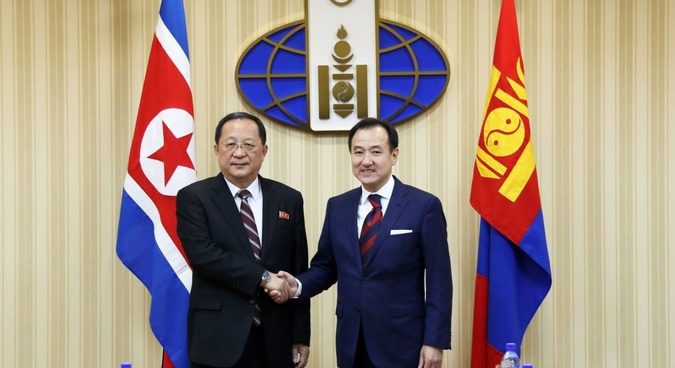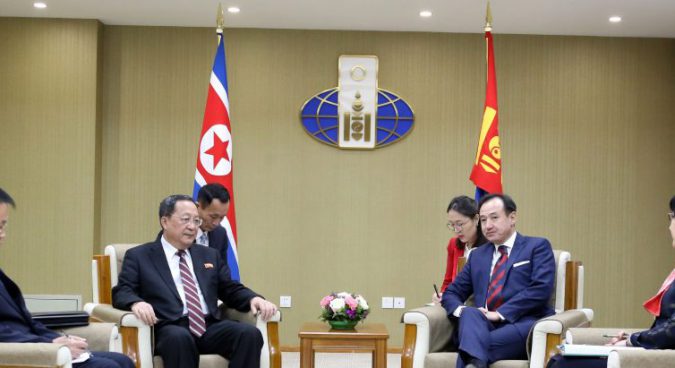By Anthony V. Rinna
Wrapping up a year of 70th anniversary celebrations, North Korean foreign minister Ri Yong Ho traveled to Mongolia this weekend following a visit to Beijing.
The visit, intended to mark seven decades of relations between Ulaanbaatar and Pyongyang, saw Ri hold discussions with his Mongolian counterpart Damdin Tsogtbaatar over DPRK-Mongolia bilateral ties as well as security issues on the Korean peninsula.

Ri’s visit to Mongolia comes two months after Ulaanbaatar issued a formal invitation to Kim Jong Un. In February of this year, too, Damdin Tsogtbaatar visited Pyongyang.
Though no longer based on a shared ideology, the Mongolia-North Korea relationship is nevertheless in a healthy state.
This isn’t so much because of shared values as it is because of coinciding interests. As Pyongyang-Ulaanbaatar ties have remained stable since 1948, Ri’s journey to Mongolia offers a chance to observe what keeps the relationship between the DPRK and Mongolia smooth, as well as what Ulaanbaatar can bring to the table in helping to address issues in Korean security.
During the Cold War, Mongolia and North Korea enjoyed a degree of solidarity as two small communist states caught between giants China and the USSR.
Nevertheless, as Balázs Szalontai asserts, relations between the DPRK and Mongolia were not always founded on ideologically solid ground. The two states often experienced diplomatic tensions. Szalontai nevertheless asserts that the DPRK and Mongolian People’s Republic tried as much as possible maintain façade of communist solidarity.
Following the end of communism in Mongolia, Ulaanbaatar pursued a highly independent foreign policy. Responding to then-U.S. Secretary of State James Baker III’s invitation to Mongolia to consider the US its “third neighbor”, Ulaanbaatar reached out across Eurasia in search of relationships in order to avoid domination by either China or Russia.
As far as the Korean peninsula is concerned, this policy of neutrality has taken the form of maintaining diplomatic “equidistance” between Pyongyang and Seoul.
The nature of contemporary Mongolia-North Korea ties have changed with the post-Cold War political shifts in Northeast Asia. Today, in search of friends beyond its giant neighbors, North Korea views Mongolia as a harmless country with which it can leverage ties. In turn, Mongolia is keen to utilize its own small stature to promote itself as a fount of small country diplomacy that can play a constructive role in global crises.
Though Mongolia attempts to portray itself as a neutral and responsible international player, Ulaanbaatar’s relationship with the DPRK has complicated Mongolia’s response to North Korean refugees. Nevertheless, Ulaanbaatar has engaged in humanitarian outreach to the DPRK – in 2013 Mongolia provided North Korea with emergency food supplies in response to food shortages in North Korea.
In recent years in particular, Mongolia has engaged in several high-level exchanges with North Korea. Then-DPRK foreign minister Ri Su Yong visited Ulaanbaatar in February 2015. The meeting led to the signing of a memorandum of understanding between the two countries.
Even in the face of increasingly stringent sanctions against Pyongyang, Ulaanbaatar is eager to continue developing economic ties with the DPRK. Landlocked but with abundant natural resource wealth, Mongolia has made moves to use the North Korean port of Rason to transport goods to foreign markets.
Indeed, as discussions continue over linking North and South Korea to Russia via rail lines, Mongolia also has potential for connecting to rail lines that traverse the Korean peninsula.
One potential multilateral format for cooperation is the ROK’s “New Northern Policy”
The geographic separation between the DPRK and Mongolia, to say nothing of either country’s relative lack of economic prowess, is bound to limit the potential of economic collaboration between Pyongyang and Ulaanbaatar. The need to involve other countries in Mongolia-North Korea trade relations, if for nothing more than logistical purposes, means that an economic partnership between the DPRK and Mongolia will most likely be best served in a multilateral format.
Indeed, one potential multilateral format for cooperation is the ROK’s “New Northern Policy“, which includes Mongolia as a prospective partner, along with North Korea.
Since the end of the Cold War, Mongolia has been a staunch advocate of nuclear disarmament and non-proliferation. In 1992, Mongolia declared itself to be a nuclear weapons-free zone. Despite Mongolia’s positive relations with North Korea, Ulaanbaatar’s anti-nuclear policy has prompted Mongolia to speak out against the DPRK’s nuclear weapons complex.
Yet Mongolian outspokenness has not caused a major disruption in Mongolia-North Korean relations. Both North Korea and Mongolia believe that that latter can play a positive role in Korean security.

The visit saw the two sides agree to continue improving ties| Photo: Mongolian foreign ministry
Furthermore, the idea of a positive role for Mongolia in Korea’s security quandary is not limited to officials in either Pyongyang or Ulaanbaatar: U.S. officials have also endorsed the idea of greater Mongolian participation in multilateral discussions over the North Korean security crisis.
Stemming from its policy of strict neutrality, Mongolia seeks to present itself in Northeast Asia as an even-handed actor.
This is partially due to Mongolia’s vulnerability due to being landlocked between China and Russia. Overt alliance with either one of these countries risks Mongolia losing its hard-won independence, while explicit alignment with China and Russia’s rival the United States would risk agitating Beijing or Moscow.
Mongolia has been offered up as a potential role model for North Korean disarmament
Mongolia, therefore, has sought to use its status as a neutral and non-threatening country to act as a resource for diplomacy and negotiations over regional security issues.
This has allowed Mongolia to pursue its “third neighbor policy”, both as a way of building a rapport with major powers as well as with smaller states such as Japan and South Korea, while not aligning with any single country or group of states.
Aside from Ulaanbaatar actively participating in regional diplomacy, Mongolia has been offered up as a potential role model for North Korean disarmament. Mongolia’s status as a nuclear weapons-free state, one that is surrounded by major powers and utterly defenseless against them to boot, may provide a basis for a similar multilateral arrangement in Northeast Asia.
Others have argued that North Korea could draw upon Mongolia’s experience in democratizing and absconding nuclear weapons while maintaining delicate balanced diplomacy.
After 70 years Mongolia-North Korea ties have proven themselves strong, even as Mongolia views its ties with the DPRK as part of a wider balancing strategy. For the DPRK, Mongolia may not be an ally, but it is at least something of a friend.
For these reasons, the bilateral DPRK-Mongolia relationship will not likely be of any major consequence in and of itself. The future of Mongolia-North Korea relations, rather, will likely be most pronounced in a multilateral format, whether in economics or security.
Edited by Oliver Hotham








0 comments:
Post a Comment